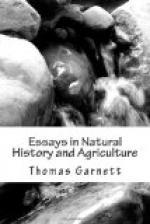I think Salmo Salar has very greatly over-estimated the quantity of Salmon fry that go down to the sea from the rivers. He speaks of them going down by millions. Now we will take the river Hodder as a river with which both Salmo Salar and myself are well acquainted, and I will venture to say that, so far is this an over-estimate, that if he would take the hundredth part of the number he would be much nearer the truth. The Samlets when they go to the sea may be reckoned to weigh eight to the pound, and two millions would at that rate weigh one hundred and ten tons. Does Salmo Salar think that one ton and a tenth of Smolts go down the river Hodder to the sea on an average of years? I have more favourable means of judging of the quantity that go down the river Ribble than I have of those of the Hodder, and I believe I should very greatly exaggerate their numbers if I estimated them at any such weight as a fourth of that quantity. Again, the Hodder and the Ribble are, in some respects, far more favourable for spawning than many other rivers; for partly owing to the country through which they pass, and partly owing to the rapidity of their streams, the gravel is large and very suitable for spawning in; there is also far less mud and sand in them, and the spawning beds are much less liable to be choked up than they are in many other rivers. No doubt the Salmon will make the best selection in their power, but they can only select from such places as there are; and if those are not suitable the ova must be in a great




